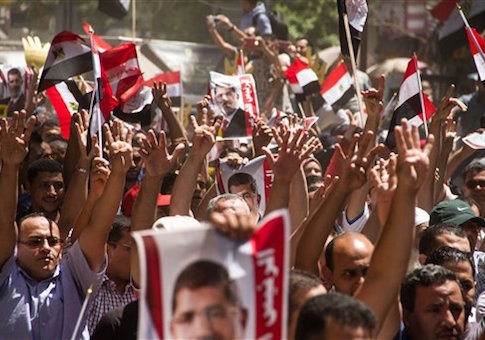JERUSALEM—overthrow of the Muslim Brotherhood regime in Egypt two years ago by the army has not led to a decrease in Islamic militancy in that country, the most populous in the Arab world, but to increased terror and instability, according to an Israeli scholar.
The imprisonment or exile of most of the Brotherhood’s leadership, says Erez Striem, "has left a huge reservoir of angry and frustrated young people". It has also left a vacuum, he says in a paper written for Israel’s Institute of National Security Studies, that global jihadi groups, including ISIS, are doing their best to fill.
After mass demonstrations led in 2011 to the overthrow of Egyptian strongman Hosni Mubarak, who had ruled for 29 years, elections were held to choose a successor. The winner, with 51.7 percent of the vote, was Mohamed Morsi of the Muslim Brotherhood, who became the first democratically elected president of Egypt. However, he too soon became the object of mass protests. A year after taking office, he was forced out by a military coup, led by the commander of the army, Gen. Abdel Fattah el-Sisi and new elections were held. The winner this time was el-Sisi himself, who left the army in order to run.
When Morsi’s followers took to the streets to protest, the army cracked down, killing some 1,400 people and detaining tens of thousands. The Muslim Brotherhood was banned and declared a terror organization. Its economic and social infrastructure was largely dismantled. Its charity organizations, mosques, hospitals and schools were either closed or nationalized. Morsi was arrested and tried for allegedly leading a mass breakout from the prison he was being held in when Mubarak’s regime fell. He was sentenced to death but the ruling is being appealed.
In his article for the Israeli think tank, Erez Striem notes that the 87-year-old Muslim Brotherhood movement has traditionally been relatively moderate in the spectrum of Islamist parties, opposing violence and accepting the Arab state as a legitimate framework. In the wake of the crackdown, the organization's centralized character has given way to local and regional groupings which increasingly tend towards militancy. The overall movement, which continues to exist despite its official banning, reiterates that it does not advocate violence. But in view of the shifting views of its members, some of whom have joined the ISIS militants in Sinai, the movement has adopted an intermediate path, which it calls "revolutionary." Interpretations of this term, says Striem, range from protest to burning telephone poles to terrorist actions against security forces.
"This dangerous process," he writes, "is likely to have momentous consequences not only for the stability of Egypt but for regional security."
